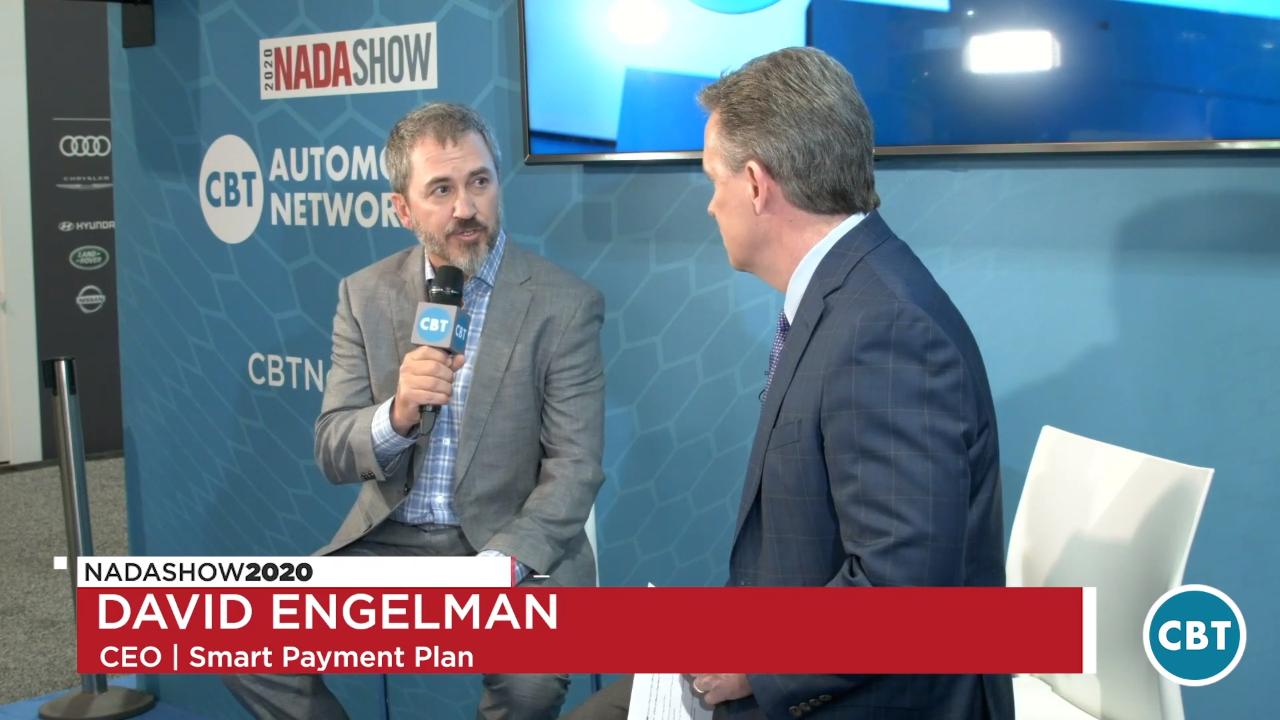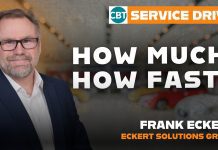SMART Payment Plan‘s CEO, David Engelman, joined Jim Fitzpatrick on the CBT Stage at NADA 2020 in Las Vegas to discuss how dealers can offer lower and easier payments that are more affordable for car buyers.
Jim Fitzpatrick: For the viewers that are watching us right now that are not as familiar with your program as we are, kind of tell us what you’re all about.
David Engelman: Well, primarily we allow dealers to offer lower and easier payments that are more affordable for car buyers.
Jim Fitzpatrick: That’s a good thing.
David Engelman: It’s a tremendous thing. 89% of Americans are getting paid weekly, every two weeks, or twice per month.
Jim Fitzpatrick: Right.
David Engelman: Yet traditionally, monthly payments are offered in dealerships. That only fits 11% of the buyers how they get paid and budget.
Jim Fitzpatrick: That’s right.
David Engelman: When you offer a lower and easier payment that matches how a consumer gets paid, it’s easier to hold more front-end gross. It’s easier to sell more vehicles, and it’s significantly easier to sell more ancillary products.
Jim Fitzpatrick: Yeah, for sure, for sure. So tell us, how does it work?
David Engelman: Well, the dealerships that participate, and we have over 3,300 dealers that have offered our service.
Jim Fitzpatrick: 3000 dealers?
David Engelman: Yes sir.
Jim Fitzpatrick: That’s phenomenal.
David Engelman: They offer our lower and easier payments on first pencil, …
Jim Fitzpatrick: Okay.
David Engelman: … and that puts a smaller payment in front of the customer when they’re making a decision as to whether to buy a car. So, a $500 a month payment for 72 months is more difficult than a $250 …
Jim Fitzpatrick: That’s right.
David Engelman: … payment that matches a customer who gets paid every two weeks, and it’s going to pay that 72-month loan off in 66 months.
Jim Fitzpatrick: Sure.
David Engelman: There’s a term reduction as well. That’s a real benefit to both the car buyer, the consumer, and to the dealer.
Jim Fitzpatrick: Yeah, for sure. No question. So they’re using this … When you first explained the situation to us I thought right away, “Oh, this is something that they use in the box, something that they use in finance to help that,” but it’s really a desk tool.
David Engelman: It absolutely is. We started as a finance program, and then we realized several years ago that offering lower and easier payments when customers are shopping for cars help sell more vehicles.
Jim Fitzpatrick: Right.
David Engelman: It’s a no brainer when you realize that most Americans get paid every two weeks, or weekly, …
Jim Fitzpatrick: That’s right. That’s right.
David Engelman: … and giving them a lower, easier payment to fit their pay cycle.
Jim Fitzpatrick: How do the dealers benefit from offering Smart Payments?
David Engelman: Well, first they sell more vehicles. They get a competitive advantage by offering the lower payments. They hold more front-end gross, $200 increase on average of front-end gross.
Jim Fitzpatrick: $200?
David Engelman: Yeah.
Jim Fitzpatrick: That’s substantial.
David Engelman: There’s more first-pencil acceptance of the payment so there’s less negotiation, so it speeds the process, as well. Then, when that customer gets back in the finance office it’s easier to sell ancillary products, service contracts, GAP, the core products that dealers are trying to sell when they’re using a lower, and easier, more affordable payment that matches how the customer gets paid. That increases typically around $800. So, when a customer matches a payment to a payday, and we have data from thousands of dealers over the years, there’s typically $1,000 of increased revenue for the dealer when the customer chooses to match the payment to the payday.
Jim Fitzpatrick: Those are substantial numbers. I mean, they’re very impressive. Kudos to you for coming up with a solution like that. It seems like a simple one but it’s great that you put that together. Those kinds of numbers, though, are really very impressive.
David Engelman: Substantial, and significant revenue drivers. These are happening for leading automotive dealers, leading, very profitable, most people will have heard of many of the dealers that we’re assisting.
Jim Fitzpatrick: Yeah, for sure. It just psychologically when somebody sees … Nobody has $500 a month, but everybody has 250 every two weeks.
David Engelman: You got it. You got it. It seems like a no brainer. In many countries the way that people pay for houses, and cars, is on a biweekly schedule, or a weekly schedule, because that’s how people are getting paid, and that’s how people are budgeting.
Jim Fitzpatrick: That’s right. You’re really doing a huge service for the consumer because that way they’re not shocked and saying, “Oh, my God, so much of the paycheck I get on the first has got to go to rent, or go to my car payment. I’m left with nothing. This helps them budget a little bit better, right?
David Engelman: You got it. It’s the convenience. They’re automated payments, and then they’re lower, and they match their pay cycles, …
Jim Fitzpatrick: Sure.
David Engelman: … and it helps pay the loan off faster.
Jim Fitzpatrick: Yeah, for sure. How does the program work? Does the dealer … Once the dealer sets the consumer up on this, how are they able to make those payments if the finance company said, “No, we’re going to charge you 500 bucks a month,” let’s say.
David Engelman: So we debit from the consumer on their pay cycle, and then we make those payments to the lender as the lender needs them collected.
Jim Fitzpatrick: Okay, great. Yeah, that’s kind of simple.
David Engelman: It is. It’s very simple.
Jim Fitzpatrick: Not a lot of onboarding if a dealer … For the dealers that are listening right now that like the sound of this, probably a pretty easy onboarding program?
David Engelman: We have a point-of-sale technology piece that we deliver to the dealers that allows them to ask the customer how often they get paid, and to match the payment to the payday right in the dealership.
Jim Fitzpatrick: Wow, that’s fantastic. Does it have the flexibility that if a consumer says, “Hey, I did this for the first couple of years but now I’m making enough money I want to go to monthly payments,” can they go off the program?
David Engelman: Well, the only reason that would happen is if they got a different job and they got paid monthly.
Jim Fitzpatrick: Sure.
David Engelman: So, they went from the 89% that are getting paid weekly or biweekly …
Jim Fitzpatrick: That’s right.
David Engelman: … and they went to a monthly-paying employer. In that instance we would convert them and keep them in the program to automate their payments, or they could make their own monthly payments.
Jim Fitzpatrick: Yeah, sure. So it’s got some flexibility in there.
David Engelman: It’s totally flexible.
Jim Fitzpatrick: Yeah, that’s fantastic. So, when you’re penciling that transaction and everybody likes the look of a 250 payment just on that four square, or on that sheet, or whatever it is that you’re presenting, could be an iPad now, it just looks better, doesn’t it? Somebody says, “Oh, 250,” even though it’s every two weeks rather than-
David Engelman: Yeah, customers are always looking for the least amount down and the longest term, and that also puts them in negative equity positions. So, because we’re paying the loan off faster, we’re reducing the negative equity situation.
Jim Fitzpatrick: Sure.
David Engelman: Also, we’re getting that customer … We’re helping the dealers be more profitable today by driving revenue today.
Jim Fitzpatrick: That’s right. That’s right.
David Engelman: Also, at four years the customer is going to have paid their principal down faster, …
Jim Fitzpatrick: Right.
David Engelman: … so they’re going to owe less to the bank, so it’s easier to get that customer back in to buy another vehicle because we have helped them pay the loan off faster.
Jim Fitzpatrick: That’s right. That’s right.
David Engelman: They’re more profitable today, and they’re building a better customer for tomorrow.
Jim Fitzpatrick: I bet for the second generation, that customer that comes back in that’s been on your program, they request that now?
David Engelman: We send the dealer a ready-to-trade notice saying that this customer has …
Jim Fitzpatrick: That’s cool.
David Engelman: … has been making payments for 48 months. They’re now sometimes $2,000 or $3,000 in a better equity position.
Jim Fitzpatrick: Sure.
David Engelman: So, it becomes much easier to call that customer, get them in a new car, oftentimes the same payment, and it’s a win-win, and it’s a longterm win, and it’s a present day win for the dealer.
Jim Fitzpatrick: I bet you’ve got some clients, dealer clients, that have called you and said, “The reason I’m calling you is because I couldn’t sell a car to one of your customers that liked the every-two-week pay cycle,” from where they bought the car. “How do I get involved in that?” If I’m on your plan, and I like it, and I’m comfortable with it, and now I go to another dealership that doesn’t offer it … Okay.
David Engelman: So, for the consumer … We actually have a lot of anecdotal stories, but one of the most humorous is two sisters bought cars from two different dealers. One sister bought a car from the dealership that offered a lower and easier payment, offered Smart Payment Plan. The other sister bought a car from a dealership that did not, and when they got together they discussed their purchases. The sister who had a monthly payment and never was offered the lower and easier payment she became actually angry, went back to her dealership and said, “Why did you not offer me a lower and easier payment that matched my payday? My sister got a lower and easier payment when she bought from a competing dealership.”
Jim Fitzpatrick: That’s interesting. This is something that’s a little out of the box for consumers, so it’s almost as if the consumer, the car buyer, feels as though that dealership went out of their way to facilitate these kinds of payments. Right?
David Engelman: It’s all about customization, giving the customer what they want, what’s easiest, and what’s best for them, and most convenient for them.
Jim Fitzpatrick: That’s right.
David Engelman: So, right away on first pencil you’re giving a payment to a customer that fits how they budget, …
Jim Fitzpatrick: That’s right.
David Engelman: … fits how they get paid at work, and it’s fully customized for that particular buyer.
Jim Fitzpatrick: Yeah, that’s for sure. You’ll do weekly, biweekly?
David Engelman: We do weekly, biweekly, twice a month, first and 15th, …
Jim Fitzpatrick: Oh wow.
David Engelman: …and so-
Jim Fitzpatrick: You have a whole array of-
David Engelman: 90% of Americans would prefer our payment.
Jim Fitzpatrick: So that’s kind of cool. When you’re penciling deals as a manager and you go out … Let’s say you say we’re going to give you two payments, 250 on the first and 250 on the 15th, and the customer says, “Well, you know, I’d like to do that but is there any way you can make it weekly?” Rather than lowering the price of the car-
David Engelman: The fastest growing segment of U.S. is getting paid, is weekly payments are growing, so we have more gig economy workers, more people that are getting paid every Friday.
Jim Fitzpatrick: Sure.
David Engelman: It’s just a heck of a lot easier to have $100 every-Friday payment than a $400 monthly payment, where as a consumer I have to start saving money, allocating my money, to make sure I have that $400 at the beginning of the month when my paycheck’s only going to be a hundred.
Jim Fitzpatrick: That’s right, and it allows that guy to spend more on that pickup truck and go home and say, “Honey, my payments are only 250. They’re not 500.”
David Engelman: And buy ancillary products, and they’re the key.
Jim Fitzpatrick: That’s right.
David Engelman: So we see, on average, a three ancillary products per deal when you match a payment to your payday, …
Jim Fitzpatrick: That’s huge.
David Engelman: … and dealers are seeing one and a half, or so, on monthly payments.
Jim Fitzpatrick: That is huge. For the dealers that are watching, any limitation? You’ll take any kind of manufacturer, all franchise dealers I assume?
David Engelman: We have phenomenal data from every brand, from every part of the country, every state. The bottom line is 89% of Americans are getting paid weekly or every two weeks, and so it doesn’t matter what state you’re in, it doesn’t matter what kind of vehicle you’re buying, and it doesn’t even matter what your credit score is.
Jim Fitzpatrick: Right.
David Engelman: Most of our customers are good credit customers, and there’s actually a misperception that it would be a bad credit customer.
Jim Fitzpatrick: I bet.
David Engelman: But, 94% of our customers have FICO scores of 600 or greater.
Jim Fitzpatrick: Wow.
David Engelman: So they’re really looking for the convenience. It’s a more educated customer. It’s for everybody. There is no qualification.
Jim Fitzpatrick: That’s great.
David Engelman: It applies universally.
Jim Fitzpatrick: It’s really designed for those people that are very concerned about their credit and they want to make sure that they’re able to make the payments when they get paid.
David Engelman: It’s one of the primary benefits, our customers tell us, is that they know they’re making their payments on time. Their credit score is increasing. So, not only are we paying the loan off faster, putting them in a better equity position, but then when they go back and for years ready to trade, their credit score has gone up.
Jim Fitzpatrick: This is a no brainer for dealers that are watching to be able to offer weekly, biweekly, semi-monthly payments. It’s a no brainer. I don’t know what the catch is. There is no catch, right?
David Engelman: It’s amazing because lower and easier payments sell more of everything. They sell more cars, they sell more ancillary products because they’re easier, they’re more convenient, and they match the pay cycle, and the budgeting cycle, of the vast majority of Americans.
Jim Fitzpatrick: At the end of the day a happier customer as a result. David Engelman, CEO of Smart Payment Plan. Thank you so much for joining us on CBD. It’s products and services like this that we want to bring to our dealer audience, because this kind of helps in a very big way to sell more cars, happier customers, sell more product on the backend. This thing’s a no brainer.
David Engelman: Everybody wins.
Jim Fitzpatrick: Thanks so much for joining us.
David Engelman: Thanks for having me, appreciate it.
Jim Fitzpatrick: Appreciate it.









